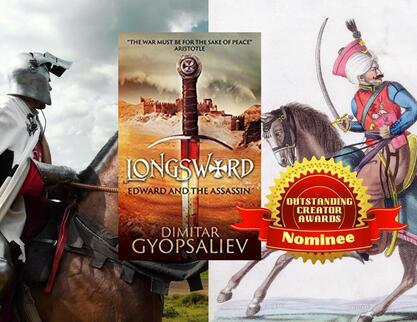|
Score: 92/100 (9.2 out of 10)
Longsword: Edward and the Assassin is an epic historical fiction novel by Dimitar Gyopsaliev. It is centered around the events of the Ninth Crusade during the reign of Sultan Baibars over the the Mamluk dynasty in Egypt and Syria. This is also during the budding rule of Edward I Longshanks. Yes, this is THE Longshanks—THE main villain and William Wallance's arch-nemesis in Braveheart, the historically-inaccurate but nonetheless entertaining 90s film. By contrast, this book aims to portray Edward I in a light that is probably more accurate to his historical character. Edward is no angel, he is a man who must do what he needs to do for his kingdom at a time of perpetual war, and facing the threat of assassination and annihilation. At the same time, he is not the genocidal mass-murdering tyrant who has his archers fire upon his own men for an advantage. Let's face it: the Crusades were some of the crappiest things that mankind ever engaged in—wars between people who hypocritically claimed to fight for a compassionate, loving, and benevolent God. The Crusaders and their Muslim adversaries did horrific things to each other including raping, pillaging, mass-murdering, torturing, and even cannibalizing each other. This, despite the fact that both of their holy books explicitly tell them not to do these things. This author, somehow, stays relatively true to the violent, chaotic, and wholly ironic spirit of the time while also making it consumable for a modern audience. This is really a character-driven story, and we love that. This is, in fact, the second fictitious Crusades book we've consumed this season, and it has the same focus on characters in the midst of a crazy situation that's mostly out of their control. The main protagonist in this ensemble cast (in which the attention is spread out) seems to be Peter, an orphan who is brought under the wing of a grizzled old warrior named Red Herring, one of Edward's best and most experienced knights. Peter, a boy seemingly without a past and an ambiguous future, is a great stand-in for the audience. Peter, at times, seems along for the ride. Some crazy things happen to him, and he is swept up in the action and violence of a world gone mad. He becomes a capable and competent hero. The fan-favorite character would have to be Diyaab al Sahra, better known as the Desert Wolf. He is a legendary warrior and assassin feared and respected by both sides. He starts the book, from what we recall, working for Sultan Baibars on a special mission to assassinate a VIP, something that actually sorta happened historically—although the book takes creative liberties with this event (which was poorly documented historically). It turns out that the Desert Wolf is on his own personal crusade for revenge! The main villain for the first half of the book seems to be Sultan Baibars, although he is still shown in a respectful and sometimes even sympathetic light. He does have loved ones whom he cares about, and he is a strong and mostly-effective leader. Imagine that: the villain from Braveheart and his knights are up against this big-bad. Sultan Baibars is legendary in his own right, being said to have dealt the Mongols (yes, the badarse, nigh-unstoppable Mongols who pretty much conquered everyone eventually) their first major defeat. And that leads us into the exciting twist in this book. We have two groups of competing and morally-gray people—the Christians under Edward and the Muslims under Baibars—who find themselves in peril by traitors and the Mongols and Tartars. Imagine that: the initial conflict that we thought was set in stone is complicated by these events. The two enemies who've been feuding for ages—going into a Ninth Crusade—must work together to survive an even bigger threat—a bigger-bad. It actually makes the story more interesting. And there's historical precedence for this happening. This would be the equivalent of if Great Britain and France were still fighting since the fall of the Roman Empire or whenever, and then Russia came out of nowhere and nuked them both before kidnapping members of both royal families and holding them for ransom. It's madness! But it makes for good drama. Now, this book does sometimes lack a degree of refinement. There are times when the wrong word is used. There are also times when words are switched or repeated. Also, there is so much going on. So much. It's hard to keep track of what's happening sometimes. Now with that said, this book is epic in scale, it has good characters, it is decently well-written, and it is very well-research. You can tell that the author really put their heart into this. Check it out on Amazon!
0 Comments
Leave a Reply. |
Archives
July 2024
Categories |

 RSS Feed
RSS Feed